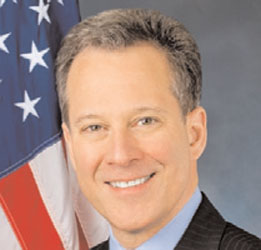
Attorney General Eric Schneiderman makes the case for shining a light on the “dark money” in state politics, proposing new regulations for nonprofits to disclose their political spending
The scandal embroiling the Internal Revenue Service – involving impropriety and outright abuse of power in its regulation of nonprofits – goes beyond targeting conservative-leaning groups based on crude word searches. It runs counter to the law for the IRS to allow any “social welfare” organization – right, left or center – to spend funds for partisan political purposes, at all.
How did we get here? And how do we stop the proliferation of shadowy, taxexempt groups that serve as vehicles for unlimited and anonymous election spending? In 2010, the Supreme Court‘s decision in Citizens United struck down any limits on outside spending in elections. The one saving grace of this otherwise disastrous ruling was its emphasis that full disclosure of contributions and expenditures was essential to allow voters to make informed choices.
In the aftermath of that decision, however, lawyers in my office’s Charities Bureau, which regulates all nonprofit organizations doing business in New York, noticed a troubling pattern. Dozens of groups formed under section 501(c)(4) of the Internal Revenue Code were spending substantial sums on political campaigns. And 501(c)(4)s, unlike traditional “Super PACs,” are not required to publicly disclose detailed information on political contributions and expenditures.
The only reason for a wealthy individual or corporation to spend money on elections through a nonprofit front group, instead of a Super PAC, is to take advantage of the fact that nonprofits can conceal their donors. But these groups are not supposed to play politics at all. In fact, the Internal Revenue Code requires that 501(c)(4)s operate “exclusively” for the “promotion of social welfare.” The IRS, however, issued regulations that misinterpreted “exclusively” to mean “primarily,” a fuzzy standard that gave these groups a wide berth to spend in elections.
Because the IRS never defined the meaning of “primarily,” this also created chaos for the IRS staff. Their absurd, and possibly discriminatory word searches and intrusive requests for detailed information were a direct consequence of the incoherent standard they sought to enforce. The IRS should simply follow the Tax Code and require 501(c)(4)s to operate exclusively for social welfare purposes, just as the Internal Revenue Code directs.
Hardly a radical notion, this would force those seeking to influence elections to do so through political committees that are subject to disclosure requirements. Closing this loophole would be a logical and rational response to the present controversy. Unfortunately, logic and rationality are not the watchwords of Washington these days. In the meantime, we need to shine some light on the flood of so-called “dark money” in state politics.
After seeing the growth of 501(c)(4) political spending in New York, my office proposed new regulations to require nonprofits that spend more than $10,000 on state and local elections to disclose who funds these efforts and how they spend the money. After a lengthy review process, the new rules went into effect last week in New York. Many other states – including a number of key electoral battlegrounds – have laws on the books that give regulators the authority to enact similar disclosure requirements. Others can and should follow suit.
While we cannot control spending in federal campaigns we can, for example, ensure that New Yorkers will know who is paying for attack ads in this year’s mayoral campaign and next year’s race for governor. State action will also expose the scope of the problem of dark money in campaigns, adding to pressure on Congress and the IRS to take action. Ideally, the IRS would enact a simple reform that would solve the problem in one fell swoop. But while we wait, state officials must do everything possible to ensure full disclosure of the secret campaign expenditures that the IRS’ gross misconduct has allowed.





Be the first to comment